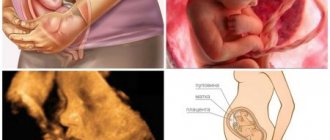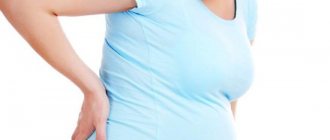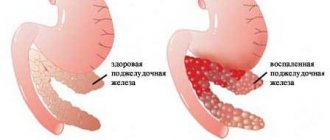Pregnancy is a period that can be overshadowed by diseases. Pathologies of the heart, blood vessels, and kidney disease are often detected during pregnancy.
Pathologies occur against the background of uterine growth and the influence of progesterone on the ureter receptors. The renal pelvis and ureters dilate, sometimes increasing in size compared to the period before pregnancy.
Pathologies often occur during pregnancy
The uterus deviates to the right, pressing on the right kidney. This is how doctors explain the identification of pathologies of the urinary system on the right side. Due to a decrease in the tone of the ureters, urine stagnates, pressure increases, which is fraught with pyelonephritis.
Other causes of kidney problems in pregnant women are:
- increased incidence of ureteral reflux;
- weakening of the kidney ligaments, which increases their mobility;
- increased production of progesterone, estrogens, glucocorticoids.
The infection can come from the bladder or intestines. The causative agents of diseases are: staphylococci, streptococci, E. coli, Candida fungi, etc.
Family planning should be accompanied by concern for the baby’s health. If infections are allowed to develop, this often leads to pyelonephritis, hydronephrosis and asymptomatic bacteriuria. Slightly less often, pregnant women encounter glomerulonephritis, urolithiasis, and abnormal development of the ureters. Below are kidney problems in mothers.
Pyelonephritis in pregnant women
The pathology is characterized by a decrease in the concentration ability of the organ. The disease poses a danger to the mother and then to the fetus. Causes complications: bacterial shock, kidney failure, miscarriage.
Pyelonephritis occurs for the first time and worsens if a woman has kidney problems before pregnancy. A woman is subject to hospitalization if exacerbations of pyelonephritis and signs of an unfavorable condition of the baby are detected.
Pyelonephritis in pregnant women can cause complications
Pyelonephritis is caused by staphylococci and Candida fungi, as well as Pseudomonas aeruginosa, pathogenic microorganisms. The infection spreads from the lesion throughout the body. Therefore, infections in the teeth, tonsils, genitals, and gall bladder must be eliminated.
Symptoms of pyelonephritis
Doctors distinguish between acute and chronic pyelonephritis.
The acute form is characterized by the following symptoms:
- heat;
- sudden deterioration of condition;
- pain in the lower back and head, covering the whole body;
- chills;
- intoxication;
- problems with urination.
Diagnostics shows the presence of red blood cells, leukocytes in the urine, epithelial cells, and casts. A blood test in the laboratory shows a drop in hemoglobin, leukocytosis, a decrease in albumin against the background of changes in protein fractions and total protein.
For the chronic course of the disease, during the lull period there is dull pain in the lower back, the number of leukocytes is increased, and protein is detected. In case of exacerbation, the pregnant woman must be hospitalized.
Kidney pain during pregnancy: causes, symptoms, treatment
Pregnancy is a difficult period when enormous overloads occur in the female body. This often results in failures. When the kidneys hurt during pregnancy, this is an alarming sign indicating a dysfunction of the organ. From the day of conception, the kidneys work at an accelerated pace. The health of the pregnant woman and the unborn child depends on their proper functioning.
Can your kidneys hurt during pregnancy?
Yes, even in a completely healthy girl. For most, the causes of this condition are natural and harmless. But sometimes they pose a serious danger to the woman and the fetus.
Why are kidney pain dangerous?
If your kidneys hurt and the girl doesn’t go to the doctor, you can get very unpleasant consequences:
- At any stage, pregnancy can be terminated.
- There is a risk of premature birth.
- There is a possibility of fetal poisoning as a result of insufficient cleansing of toxins from the body, which is carried out by the kidneys.
The consequences depend on how advanced the disease is, how the woman feels and what means she is treated with. When problems first appear, home therapy is carried out. If the condition is neglected, the pathology can result in the death of the fetus.
How to understand that it is the kidneys that hurt
Pregnant girls often complain that their spine or lower back hurts. Therefore, nagging pain in these areas is often simply ignored.
There are certain signs that indicate that it is the paired organs that are hurting:
- There is pain when urinating.
- The girl walks “small” more often than usual.
- Acute pain appears in the lower abdomen, side and along the lower back.
- Even when the position of the body changes, the kidneys continue to hurt.
- Pain begins with every touch to the lower back.
- Swelling and heaviness in the legs occur.
- Blood pressure rises.
- The head constantly hurts, the temperature rises, the woman shudders. Sometimes the expectant mother vomits, feels sick, loses her appetite, and feels weak.
If the kidneys hurt in the early stages of pregnancy, the girl has a fever, chills, and complains of paroxysmal pain in the abdomen.
Most often, girls have pain in their right kidney during pregnancy. The fact is that the uterus presses on it with greater force due to its location. Most problems with the genitourinary system begin on the right.
Why do your kidneys hurt during pregnancy?
There are physiological causes of such pain:
- Metabolic disorders occur, so salt and stone-like deposits form, leading to pain.
- The uterus has become larger in size, so it puts pressure on the kidneys. This is most noticeable from 14 to 26 weeks of pregnancy. The ureters are compressed, as a result of which the timely outflow of urine becomes difficult, and it accumulates in the renal pelvis.
- The reasons lie in hormonal changes. During pregnancy, the level of progesterone increases greatly, which relaxes the muscle valves that regulate the passage of fluid from different organs.
- The efficiency of the kidneys increases, since with their help the waste products of mother and child are eliminated. The daily volume of urine increases, so the kidneys begin to function at an accelerated pace.
A nagging pain in the kidneys that occurs closer to childbirth often indicates serious health problems.
Possible diseases and their symptoms
Any kidney disease during pregnancy should be kept under control and treated with available means. Impaired renal function can lead to the death of the woman and the fetus.
Other diseases
Unpleasant sensations in the back area are not always associated with the fact that a pregnant woman has diseased kidneys. There are other possible reasons:
- The girl has problems with her spine. Osteochondrosis, hernias, and protrusions are often diagnosed.
- There may be gallstones, duodenal ulcer, pancreatitis.
- Inflammation of the ovaries.
- There is a risk of miscarriage. This phenomenon is often accompanied by spasmodic pain, bleeding, and high fever.
Kidneys can hurt for various reasons. If you feel pain, you need to go to the doctor.
How are kidney diseases diagnosed?
Pregnancy is often accompanied by kidney problems. To exclude serious pathologies, you must first contact your gynecologist, who will give you a referral to a urologist or nephrologist. A urine test will be prescribed, which will show whether there is any pathology. You also need to undergo an ultrasound of the kidneys, thanks to which hidden diseases can be identified.
What to do if your kidneys hurt during pregnancy
There is no need to treat yourself. The diagnosis is made by a doctor after tests. He also prescribes appropriate therapy.
If the problem is not very serious, the expectant mother is recommended to diet, as well as take herbal medicines that are safe for the child. They improve the excretion of urine from the kidneys and have an anti-inflammatory effect.
When the disease is already in an advanced state, the doctor will prescribe antibiotics. In some cases, you will have to undergo treatment in a hospital.
Pharmacy medicines
All medications must be prescribed by a doctor. In the early stages, drug therapy is prescribed with great caution, since during this period all the organs and systems of the child are formed. After determining the cause of pain on the left or right, the doctor prescribes:
- Antibacterial agents that block the spread of disease. The approved medications in this series are Amoxiclav, Oxacillin, Monural, Ampicillin.
- Herbal medicines with a diuretic effect that reduce inflammation (Canephron, Fitolysin).
- For fever, safe antipyretics are prescribed - Paracetamol and Ibuprofen.
Folk remedies
You can treat kidneys during pregnancy using traditional methods. Before such therapy, you should definitely go to the doctor, since some herbs can cause allergies.
Here are a few folk recipes that will help when your kidneys hurt:
- Decoction of corn silk. Take 3 tbsp. stigmas, pour 1 liter of boiling water, cook in a water bath for 30 minutes. Next, the broth is filtered and taken up to 4 times a day, 50 ml.
- An infusion of lingonberry leaves, horsetail, and bearberry flowers. Take 1 tbsp. each component, pour 200 ml of boiling water and leave for 2 hours. To enhance the healing properties, you can add 200 mg of mumiyo. The decoction is taken three times a day 30 minutes before meals.
- A decoction of rose hips and bearberry leaves. The ingredients are taken in equal proportions, poured with a glass of hot water, and left in a water bath for 5 minutes. Take 100 ml of decoction in the morning and before bedtime.
Pharmacies sell special urological herbal teas that you can drink on the recommendation of a doctor.
How is pyelonephritis treated in pregnant women?
While carrying a child, after childbirth, a woman with pyelonephritis is treated according to the principles of standard therapy, inoculating the biomaterial and testing sensitivity to antibacterial drugs. Pregnant women are prescribed a diet enriched with vitamins and are advised to avoid hypothermia.
You need to sleep on the healthy side, take the knee-elbow position several times for 15 minutes. A course of antibiotics, detoxification therapy, antispasmodics, and diuretics are prescribed. If drug therapy does not help, ureteric catheterization is indicated.
Pyelonephritis in pregnant women is treated with a course of antibiotics
Childbirth takes place naturally, cesarean is undesirable. About 10% of cases with complicated pyelonephritis require early delivery.
Pregnancy and glomerulonephritis
Among other renal pathologies in pregnant women, glomerulonephritis is diagnosed in 1-9% of cases. The pathology is a disease of the glomeruli of the kidneys of an infectious-allergic nature. The causative agent is streptococcus. The cause of glomerulonephritis is influenza and tonsillitis.
The clinical picture of glomerulonephritis is characterized by pain in the lower back, head, low performance, and frequent urge to urinate. The first is swelling under the eyes, on the legs, and stomach. Urine tests reveal casts, leukocytes, red blood cells, and protein. Severe form of glomerulonephritis is accompanied by anemia, increased urea and creatinine.
Why is kidney disease dangerous?
The condition is considered very risky for the mother, since 11% of cases occur miscarriages, 29% - premature births. There is a possibility of kidney failure, heart failure, encephalopathy, and complications that can lead to the death of a woman or child. Other complications include: bleeding, thrombocytopenia, severe hypocoagulation, death of a premature baby.
In the early stages, a woman undergoes an examination and when a pathology is detected, the question of the advisability of bearing a fetus is decided. In case of acute glomerulonephritis, termination of pregnancy is indicated, and the next one is possible only 3-5 years after the kidney pathology. A poor prognosis awaits with chronic glomerulonephritis, if azotemia and hypertension are detected, then continuation of pregnancy is contraindicated.
Treatment of pregnant women is carried out by a nephrologist in tandem with an obstetrician-gynecologist. In the early stages, hospitalization of the pregnant woman is prescribed, treatment in a hospital, if the condition worsens, there is a risk of miscarriage, hypoxia, and fetal malnutrition. At 36-37 weeks, a woman is admitted to the hospital to prepare her for childbirth and choose a method of delivery.
There are a number of indications when delivery is indicated.
These are the following states:
- decreased renal blood circulation;
- failure of glomerular filtration;
- decreased daily diuresis;
- failure in protein metabolism;
- increased nitrogen in tests;
- hypertension.
In some situations, they begin to prepare the birth canal according to diagrams. Prevention of bleeding is indicated, antispasmodics are prescribed. Caesarean section is not recommended if obstetric indications are detected.
Pregnancy and kidney disease: dangers and features
When carrying a child, the entire body experiences increased stress, but most of it lies on the kidneys. And a lot depends on these organs, so pregnancy and kidney disease are always a difficult combination.
Depending on the degree of the disease, carrying a baby can be associated with various complications. This applies to both the woman’s condition and the development of the fetus.
Therefore, any kidney disease during pregnancy requires the closest attention from a gynecologist and nephrologist.
Most common diseases
During pregnancy, women's immunity decreases, which creates the preconditions for the development of various inflammations caused by bacteria, viruses, fungi or protozoa.
Against the background of hormonal changes, metabolism changes - first of all, this affects water-salt metabolism. Because of these factors, in almost all cases the chronic form of kidney disease worsens or an acute form appears.
The most common abnormalities include pyelonephritis, glomerulonephritis, urolithiasis, and asymptomatic bacteriuria.
Development and symptoms of pyelonephritis
Pyelonephritis is a pathology in which infection affects the renal pelvis. Most often, the cause of inflammation is microorganisms that penetrate the kidney through the ascending route, from the external genitalia, urethra or bladder. Less commonly, the route of infection is hematogenous - bacteria reach the pelvis through the bloodstream from a distant source of infection.
Acute pyelonephritis is characterized by symptoms such as a significant increase in temperature with weakness, chills and sweating, headache, and nausea. The patient is bothered by thirst, appetite is reduced, and sleep disturbances occur.
Urination becomes more frequent, becomes painful, there is a feeling of heaviness in the lower back, severe pain. The mucous membranes are dry, swelling of the eyelids develops. In many cases, the disease is accompanied by cystitis, an inflammation of the bladder.
You can learn about the treatment of pyelonephritis in pregnant women here.
The chronic form does not have such pronounced symptoms, but when carrying a child, exacerbations always develop, occurring in the manner described above.
The danger of this kidney disease during pregnancy is that there is a significant risk of its interruption and the development of life-threatening complications.
Causes and manifestations of glomerulonephritis
This disease is immuno-inflammatory in nature, affecting the renal glomeruli and tubules. The pathology appears mainly after an acute infection, most often a sore throat.
In response to the penetration of a pathogen into the body, the immune system produces antibodies to bacteria, but antigen-antibody complexes interact with biologically active substances, forming a deposit on the renal capillaries, causing vasculitis, impairing blood circulation, and changing the process of primary urine production.
As a result, water retention occurs, water-salt metabolism is disrupted, and in severe cases this leads to renal failure.
Symptoms of glomerulonephritis appear abruptly. The disease begins with an increase in temperature, accompanied by all signs of intoxication. The patient's skin is pale, the eyelids are swollen, and diuresis is significantly reduced. Later, the amount of urine increases, but with a loss of density and the appearance of blood.
Facial swelling is one of the leading symptoms. They are most pronounced in the morning and subside in the evening. As the disease progresses, edema spreads to the entire body, up to the appearance of ascites and anasarca. Thirst and dry mouth occur. Symptoms are accompanied by pain and heaviness in the lower back, diarrhea, and vomiting.
Most patients develop severe acute hypertension, and in almost all cases the cardiovascular system is affected.
Urolithiasis disease
The process of stone formation in the kidney cavity is called urolithiasis or urolithiasis. The disease is asymptomatic in the initial stages. Manifestations appear when inflammation occurs due to infection or after the movement of a stone, blockage of the ducts, or damage to the wall of the ureter.
The main symptoms of this pathology are pain, blood in the urine, impaired urination, even its absence. The kidneys hurt in different ways, depending on the size, location of the stone, and the severity of the inflammatory process. The range of sensations: from dull, aching to sharp and severe pain (renal colic).
This kidney disease during pregnancy requires constant monitoring, since the occurrence of colic or blockage of the urinary tract, the inflammatory process can lead to serious complications: intoxication and even termination of pregnancy.
Asymptomatic bacteriuria
On average, it is detected in 6% of pregnant women, but it cannot be said that the pathology develops after conception. On the contrary, bacteria are present in the urine even before fertilization, but since the course of the disease is asymptomatic, they are detected only after the woman is registered and tested. Most often, Escherichia coli is detected during culture.
There are several causes of the pathology:
- intense sexual activity without using condoms;
- low socio-economic level;
- decrease in local and general immunity due to changes in the body, taking certain medications;
- violation of sterility during diagnostics and collection of biomaterial.
Bacteriuria manifests itself only with the development of the inflammatory process. In many cases, a chronic form of pyelonephritis is diagnosed.
Features of the treatment of kidney diseases during pregnancy
For diseases of the kidneys and other organs of the urinary system, therapeutic tactics consist of several points:
- elimination of inflammation;
- normalization of water-salt metabolism;
- normalization of urine and blood parameters;
- symptomatic therapy;
- prevention of complications.
There are many effective drugs that are successfully used in nephrology. But managing a pregnant woman with kidney disease is a different matter, since now it is necessary to take into account not only the effectiveness of certain medications, but also their effect on the child. This factor significantly limits the capabilities of doctors.
Antibiotics are used to eliminate inflammation. In the first trimester, penicillins are used, mainly amoxicillin. In the second and third trimester, 2nd and 3rd generation cephalosporins and macrolides are used.
Other groups of antibacterial agents are not recommended due to their toxic effects on the fetus.
But even after childbirth, some medications remain prohibited due to their nephrotoxicity - we are talking about aminoglycosides.
In addition to antibacterial therapy, pregnant women with kidney disease are prescribed supportive and symptomatic therapy: herbal preparations, vitamins, substances that help strengthen the immune system and normalize metabolism and blood pressure.
All medications are selected based on the ratio of their benefits to the woman and possible harm to the fetus.
During treatment, the patient should regularly undergo urine and blood tests, and have an ultrasound of the kidneys - this will allow monitoring the effectiveness of therapy. Ultrasound obstetric examination also visualizes the development of the baby.
Be sure to follow a diet and drink regimen. If the condition allows, exercise therapy or special gymnastics, walks in the fresh air are recommended. Mostly therapy is carried out in a hospital setting, but it all depends on the patient’s condition and the likelihood of complications.
Complications of kidney diseases
Due to the disorders described above, gestosis is difficult - toxicosis in the second half of pregnancy, which is manifested by edema and increased blood pressure. Severe gestosis threatens spontaneous abortion, placental abruption, intrauterine growth retardation, chronic hypoxia or death.
With glomerulonephritis and urolithiasis, renal failure develops - a condition that threatens the life of the pregnant woman and child.
With pyelonephritis and bacteriuria, there is a high probability of intrauterine infection of the fetus. Therefore, in order to bring your pregnancy to a normal birth, you need to monitor your health, undergo timely examinations, and do not neglect the doctor’s recommendations, especially if your kidneys hurt.
Prevention
It is necessary to regularly monitor the indicators of a general urine test. If the disease was diagnosed before conception, an ultrasound scan of the urinary system is periodically performed. The same examination is prescribed when planning pregnancy.
After diagnosis, the patient must strictly follow a diet - spicy, fatty, salty foods are excluded, it is recommended to drink large amounts of water. It is necessary to avoid hypothermia and promptly treat infectious pathologies, even mild ones.
Contraindications for pregnancy
Mostly, diseases of the urinary system do not interfere with the normal bearing of a child, but there are exceptions:
- pyelonephritis of a single kidney;
- renal tuberculosis;
- hydronephrosis;
- severe hypertension;
- chronic or acute glomerulonephritis;
- renal failure;
- azotemia.
These conditions are absolute contraindications for pregnancy, since there is a serious threat to the woman’s life.
Source: https://nefrologinfo.ru/mamy/beremennost-i-zabolevaniya-pochek.html
Treatment of glomerulonephritis in mother
Acute glomerulonephritis is treated with antibacterial drugs. Penicillin and its derivatives are used. Additionally, medications for blood pressure, diuretics, and ganglion blockers are prescribed to reduce the load on the heart.
Before choosing a particular drug, the doctor evaluates the woman’s health, indications and contraindications, and individual sensitivity to drugs. Additionally, vitamin therapy is carried out.
The doctor will be able to prescribe appropriate treatment
If acute renal failure is detected, a catheter is placed in the ureters to carry out diagnosis and treatment.
Treatment
Treatment should be selected by a specialist, and only after passing all the necessary tests. If kidney disease overtakes a woman in the early stages of pregnancy, then treatment with antibiotics and other similar medications is strictly prohibited. Treatment usually consists of following a diet , taking herbal medicines and drinking plenty of fluids.
The diet consists of avoiding fatty, spicy, and sour foods - all this negatively affects the functioning of the kidneys and interferes with their recovery. It will be useful to take herbal infusions , which have diuretic and anti-inflammatory effects.
Chamomile infusion - can be used as an antimicrobial and diuretic. It’s easy to prepare; pour two tablespoons of chamomile into 1 liter of boiling water. Leave for 30 minutes and take before meals for 7 days. Chamomile has a beneficial effect on the immune system, especially during illness. The plant is also excellent for relieving cramps.
Cranberries are a very effective remedy for the treatment and prevention of kidney diseases. Cranberry gently removes germs and bacteria from the body and helps break down kidney stones. It should also be noted that this berry has good preventive properties. It creates an acidic environment in the body in which bacteria cannot live. Cranberries are useful to eat in the form of whole berries, as well as in the form of fruit drink.
Lingonberries are an excellent remedy for eliminating swelling. Lingonberries also have antimicrobial properties. For kidney pain, lingonberries are usually added to berry fruit drinks or eaten fresh.
Nettle decoction is used as a mild diuretic. Nettle helps break down formed kidney stones. The plant also has good anti-inflammatory properties. It is recommended to take 1 teaspoon of decoction orally before meals.
Burdock root is a time-tested diuretic, antimicrobial and analgesic. A decoction from the root of the plant can be taken orally, and also added to the bath or washed the genitals.
Urolithiasis in a pregnant woman
The pathology occurs less frequently than previous diseases, in 0.1-0.2% of cases of kidney disease in pregnant women. Urolithiasis is provoked by a failure of phosphorus-calcium metabolism, changes in oxalic acid, uric acid, dilation of the renal pelvis, urinary tract, poor urine drainage against the background of an increase in its concentration - all leading to urolithiasis. Other reasons are infectious in nature.
Urolithiasis occurs against the background of pyelonephritis. Due to disturbances in urodynamics and dilation of the ureters, stones can begin to move pathologically, and the condition of the pregnant woman is endangered.
During pregnancy, a woman learns about the presence of stones in the urinary organs, and the disease begins to become more complicated.
Kidneys during pregnancy: possible complications, symptoms of disease, treatment methods, prevention
Kidneys during pregnancy, like all organs at this time, work in an enhanced mode. The body of the expectant mother may malfunction, which happens quite often with the kidneys. In this article we will talk about the work and diseases of this organ during pregnancy, we will find out why the kidneys may begin to hurt or enlarge.
Why are the kidneys susceptible to disease during pregnancy?
For expectant mothers, it is the kidneys that are most stressed.
While waiting for the baby, the organs must remove from the woman’s body not only her urine, but also the baby’s waste products, which enter the blood through the placenta.
But the hormone progesterone, by the presence of which pregnancy is detected, reduces the tone of the bladder, and urine can stagnate, which leads to easier infection, which causes diseases such as pyelonephritis.
It happens that the disease existed before pregnancy, but the woman did not suspect about it, and pregnancy can cause the awakening of this disease.
In the early stages of pregnancy, the kidneys are usually not bothered, only if there were no diseases associated with these organs before pregnancy. Next, let's talk about diseases that most often occur while expecting a baby.
What doesn't hurt during pregnancy! Of course, at the first unpleasant sensation, not every woman will immediately run to the doctor.
Expectant mothers especially often experience back pain, and often this is the norm, because the spine also experiences incredible stress.
But how to recognize kidney disease during pregnancy? It will not be possible to diagnose the disease on your own, but there are a number of symptoms that indicate problems with the health of the kidneys.
- pain in the lumbar region - a finger or two higher;
- pain from the lower back moves to the side, radiating to the lower abdomen;
- protein in urine - determined by tests;
- after emptying, it seems that the bladder is not empty;
- blood pressure increases;
- swelling appears on the legs, arms, and face;
- when urinating there is discomfort, even pain;
- pain in the lumbar region does not go away, aching, does not get better even when changing position;
- Nausea, fever, chills may occur.
An ultrasound of the kidneys during pregnancy may show dilation above normal. What could this mean?
Causes of kidney enlargement
Whether the right kidney is enlarged during pregnancy or the left one, there are a variety of reasons for this:
- Pyelonephritis. This is the most common disease among pregnant women. We will talk about this disease in more detail below.
- Glomerulonephritis. This disease is an immune-inflammatory disease and often occurs as a complication after influenza or tonsillitis. Symptoms may include swelling in the face and legs, frequent urination, and a dull ache in the lower back.
- Kidney stones also form quite often during pregnancy, and it is they that cause the organ to expand. A stone can become an obstacle to the outflow of urine by getting stuck in the ureter or when leaving the renal pelvis, which is how the organ enlarges. If there are stones in the kidneys, the first sign of this will be unbearable pain, especially when urinating. Small grains will be visible in the urine - finer than sand, reminiscent of powder.
The kidneys may be enlarged during pregnancy due to many medical conditions that require a more detailed review. We suggest moving on to familiarize yourself with the most common ailments that occur during pregnancy.
Hydronephrosis
When urine stagnates, which is caused by disturbances in its outflow, hydronephrosis often appears. This is a serious disease that causes enlargement of the calyces and pelvis of the kidneys, thinning of the walls, and atrophy. The disease is progressive, with a deterioration in basic kidney functions.
https://www.youtube.com/watch?v=6wYAJZFlLW4
The most common cause of this disease is pregnancy itself. The uterus enlarges and begins to put pressure on the ureters, interfering with the outflow of urine. Liquid accumulates in the pelvis and cups, deforming and stretching them.
There may be other, rarer causes for hydronephrosis:
- cystitis;
- injuries;
- infections;
- damage to the spinal cord;
- tumors and metastases.
There are three stages in the development of hydronephrosis:
- Stagnation of urine, small dilations in the renal pelvis and calyces.
- Stronger expansion of the pelvis and calyces, the kidneys increase by an average of 20%.
- The kidneys double in size, the pelvis and calyces are greatly expanded.
At each stage of the development of the disease, there is a frequent urge to go to the toilet, but very little urine is released.
Cystitis
Cystitis may be the first manifestation of many urological diseases during pregnancy, including pyelonephritis. When cystitis appears, the woman’s general condition worsens.
She becomes lethargic, her ability to work decreases, weakness appears, and her temperature can rise to 37.5 degrees. With further development of the disease, frequent urination is observed - every 30-40 minutes.
At the end of urination, a woman may feel cutting pain.
To confirm the diagnosis, it is necessary to take tests not only of urine, but also of blood. Acute cystitis lasts from a week to ten days. If the disease drags on, you will need to undergo an examination to identify possible inflammatory processes.
Cystitis must be recognized in time and treatment must begin as soon as possible. This will help minimize the likelihood of developing a more serious disease - pyelonephritis, which has many harmful consequences not only for the pregnant woman, but also for her fetus.
Pyelonephritis
Let's talk about this kidney disease during pregnancy in more detail, because it is the most common - it occurs in 7% of pregnant women!
Pyelonephritis rarely occurs in the early stages, most often developing from the second trimester. Expectant mothers who have been diagnosed with pyelonephritis are included in a special risk group. The disease can cause:
- the appearance of gestosis - a dangerous pathology for mother and baby;
- intrauterine infection, in which the fetus stops growing and developing;
- premature birth.
But the most dangerous thing for a woman is the development of acute renal failure due to pyelonephritis. A woman's kidneys may partially or completely refuse to work.
The cause of pyelonephritis is often pregnancy itself. The uterus begins to compress the organs, interfering with the excretion of urine. Also, during pregnancy, hormonal levels change dramatically, and this causes the development of many diseases. In addition, pyelonephritis can develop for other reasons:
- diabetes;
- urolithiasis;
- cystitis before pregnancy;
- malformations in the development of the urinary tract and kidneys.
Degrees of risks for pyelonephritis for pregnant women
- The first degree is pyelonephritis that occurs during pregnancy and proceeds without complications.
- The second degree is progressive chronic pyelonephritis, which the woman had before pregnancy.
- The third degree is the most dangerous, blood pressure increases, and arterial hypertension is observed. In this case, only one kidney may be affected by the disease; for example, a diagnosis is made: the right kidney is enlarged.
During pregnancy, pyelonephritis should be observed not only by a general practitioner and nephrologist, but also by an obstetrician-gynecologist.
Timing of occurrence of pyelonephritis during pregnancy
There are certain periods when there is a high probability of developing pyelonephritis. This is due to hormonal changes in the body, the work of the kidneys and the load on them.
All pregnant women are required to undergo urine tests several times throughout their entire pregnancy. This also allows you to track the possible development of pyelonephritis, because at the beginning it can be latent.
Most often, this disease occurs between the 22nd and 28th weeks of pregnancy. But there is a possibility of development at 12-15, 32-34, 39-40 weeks, as well as on the 2-6th day after birth.
Kidney treatment during pregnancy
Treatment should be aimed at fighting the infection that caused the disease, so it is necessary to undergo a full range of tests. Further, only a doctor can prescribe medication and beneficial herbs.
Patients with any kidney disease are prescribed to drink plenty of fluids; cranberry juice, which contains sodium benzoate, will be especially useful. This substance is converted into hippuric acid, which has a bactericidal effect.
Diuretics and antispasmodics are prescribed to help restore normal urine flow. Antibacterial drugs - according to the causative agent of the disease.
With timely treatment of kidneys in pregnant women, organ functions are fully restored after childbirth. If the disease is neglected, it can develop into a chronic disease and make itself felt at every stage of life.
The main thing is not to self-medicate at the first signs of illness. Treatment can only be prescribed by a doctor who has recognized the virus from tests!
Prevention of kidney diseases in expectant mothers
Pregnant women can protect themselves from the occurrence of kidney diseases by taking preventive measures. By following simple rules, you can survive the period of waiting for a baby without consequences for your body.
- Every day, drink at least a glass of cranberry or lingonberry juice. These berries are good not only for the treatment of kidney diseases, but also for prevention.
- From the first days when you find out about pregnancy, you need to adhere to a diet that will help maintain kidney health. Avoid everything salty, smoked, fried, and fatty. Eliminate white bread and all legumes from your diet.
- You need to drink at least 2 liters of water per day.
- Go to the toilet as often as possible, do not tolerate it under any circumstances.
- Clothes should be loose; remove all tights and swimming trunks that are tight or cause discomfort.
- Buy underwear only from natural cotton; this can be found in departments for pregnant women.
- Don't take a bath, use a shower.
- Don't forget about gymnastics for pregnant women.
If you don’t have the opportunity, time or simply desire to attend gymnastics in a group, then be sure to do one exercise at home - stand on all fours. Take this pose 3-4 times a day, hold for 15 minutes. The uterus in this position will not put pressure on the urinary tract and kidneys, the organs will rest a little from the heaviness. This exercise also helps with back pain.
Source: https://FB.ru/article/405500/pochki-pri-beremennosti-vozmojnyie-oslojneniya-simptomyi-bolezney-sposobyi-lecheniya-profilaktika
Symptoms and treatment of urolithiasis
Symptoms of renal pathologies also appear in the case of urolithiasis - hematuria, pain, changes in urine tests. An attack of pain occurs and radiates to the labia, epigastric region, and legs. It is necessary to differentiate kidney stones from cholecystitis and acute appendicitis.
To alleviate the condition, pregnant women look for a position where the pain could be reduced. This is a horizontal position on your side, a knee-elbow position - this can reduce pain. Pregnant women experience colic on the right side, which is caused by pressure from the growing uterus.
Blood tests are normal, but a urine test reveals salt crystals, red blood cells and an increase in white blood cells. Due to an attack of colic, there is a risk of miscarriage and premature birth. Sometimes doctors talk about premature birth if they cannot stop the attack.
It is difficult to diagnose stones in the urinary system of a pregnant woman; X-rays are prohibited in the first trimester, and not recommended in the second. The best option is to identify ICD before pregnancy, which is not difficult if you approach the issue of planning children responsibly.
Symptoms of the disease
All urinary tract infections have almost the same symptoms.
All urinary tract infections have almost the same symptoms, which manifest themselves in:
Causes of kaliectonasia during pregnancy
- constant desire to go to the toilet, provided the bladder is almost half empty;
- attacks of pain in the lower abdomen and lumbar region;
- feeling of discomfort or burning during urination or sexual intercourse;
- the urine becomes cloudy, may have an unpleasant odor or may contain blood clots.
For information! During the infectious period, low-grade fever can rise to 37.5C degrees, but most often the temperature remains normal.
Symptoms of a kidney infection can occur either unnoticed by a woman or appear suddenly, they are expressed:
- increased sweating, chills;
- fever or sudden increase in temperature;
- attacks of nausea and vomiting;
- severe pain in the lower abdomen, side, and hypochondrium.
For information! Asymptomatic bacteriuria leads to the premature birth of a child with low birth weight. If the disease is left untreated, the risk of developing a kidney infection increases to 40%.
Most often, a woman does not immediately notice an infection, for example, cystitis, because... Due to fetal growth, the number of urinations increases. However, if you notice any changes, contact a specialist immediately.
Asymptomatic bacteriuria
This condition occurs in 10-45% of women. It is characterized by an increased number of virulent microorganisms without signs of infectious damage to the urinary system.
Asymptomatic bacteriuria is a condition when 100 thousand bacteria (Proteus, E. coli, Klebsiella, Enterobacteriaceae, etc.) are detected in 1 ml of urine taken through a catheter. Women undergo diagnostics to exclude the presence of urinary organ disease.
Asymptomatic bacteriuria occurs in 10-45% of women
In a quarter of cases with asymptomatic bacteriuria, acute pyelonephritis develops, so pregnant women need to undergo timely therapy with antibacterial drugs, nitrofurans and other medications as prescribed by a doctor. Tetracyclines should not be taken in the first trimester unless absolutely necessary. The success of therapy is monitored using urine culture.
Features of pain development
Why does pain occur in the left kidney?
Pain localized on the left side of a pregnant woman often indicates urolithiasis and the advancement of stones through the urinary organs. They can go out on their own up to 34 weeks; in later stages they will require help and special medications, since their progress causes pain and causes colic in the left kidney. The stones pass due to weakening of the muscles of the ureters and renal pelvis, as a result of which the left kidney hurts during pregnancy. If urination becomes difficult and the lower back begins to hurt during pregnancy, immediately call an ambulance. It is strictly forbidden to try to eliminate painful feelings with a heating pad or warm compress.
Soreness on the right side
Kidney pain during pregnancy is not always a reason to panic.
Often, during pregnancy, a woman’s kidneys ache and pain is felt on the right side. The right kidney often hurts due to its location: higher than the left. Because of this, a lot of pressure is placed on the right organ from the growing uterus and fetus. The first sign of inflammation that occurs against the background of kidney disease also appears first in the right kidney. A pathological condition not related to the growing fetus is a situation when additional signs appear:
- impaired urinary excretion with pain;
- change in urine color;
- temperature increase.
Early kidney problems
Pain in the kidneys in the early stages requires increased attention from the woman and doctors. During this period, the kidneys experience greater stress due to pregnancy. But if additional symptoms appear, you should immediately see a doctor, as this may be an infection in the kidneys, which manifests itself in an acute form. In this case, the woman is concerned about the following symptoms:
- pain in the back and kidneys;
- temperature increase;
- chilly and feverish feeling;
- frequent small trips;
- blood impurities in urine and changes in its color;
- sharp spasms in the lower abdomen.
Prenatal kidney pain
The appearance of pain in the kidneys before childbirth is normal.
When the kidneys hurt during pregnancy in the last stages and discomfort is felt, this often signals an approaching birth. The problem does not require treatment and goes away on its own after the baby is born. To make women feel better and not be so bothered by uncomfortable feelings, it is recommended to do gymnastics. The woman takes the position “on all fours” and lingers in it for some time. You can also relieve pain with an exercise ball. Gymnastics are carried out daily for a quarter of an hour.











